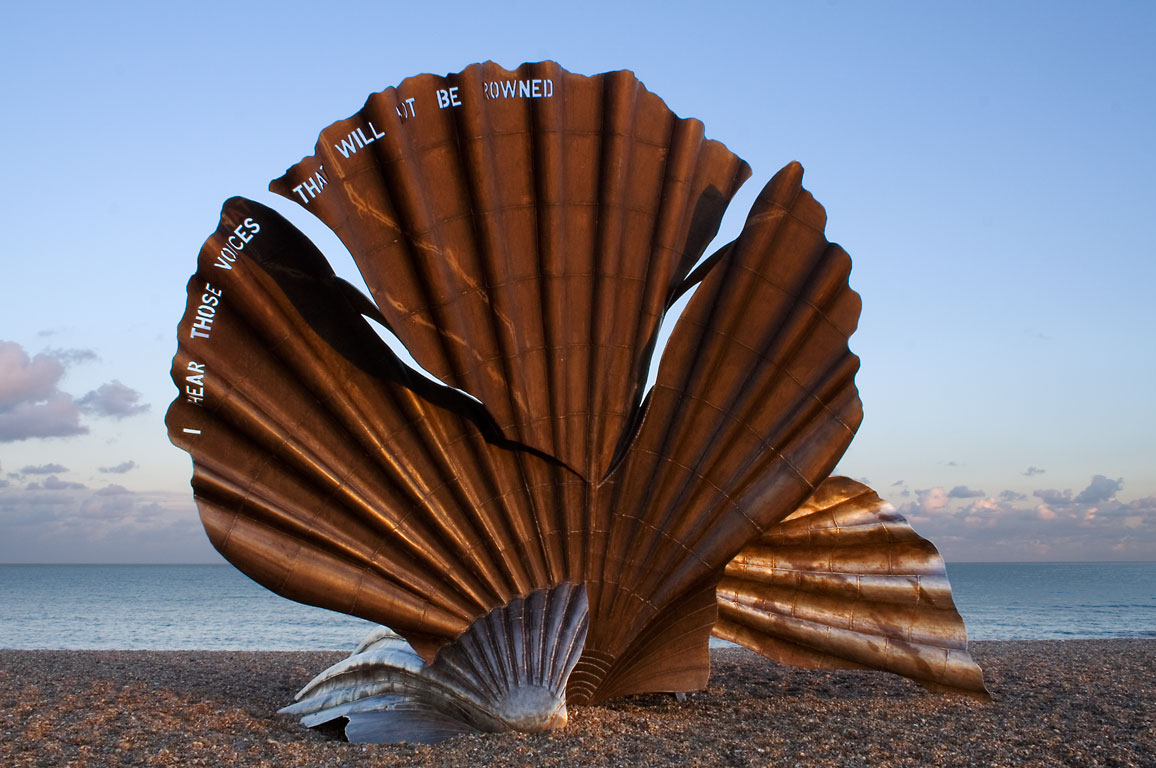Two very busy days later, I submitted "Shell Game" and it got published in the September of that year. I've included it below and I'll stick "Tomb Town" up later. It's still my favourite of the two, dark or not.
Shell
Game
“I
don’t understand,” said Kelvin, staring up at the sculpture.
“There’re no shells here, but there’re huge metal scallop
shells sitting on the beach.”
We
all have our crosses to bear: mine is my new superior officer, DCI
Kelvin – crass, balding and fat.
I
looked at him incredulously. London had sent him here a month ago,
but he still knew nothing about the area.
“The
town has a long history…” I started but Kelvin walked away
mid-sentence, crunching unsteadily across the loose shingle.
“DC
Guyton…are you coming?” he called back irritably. I smothered my
sharp reply and followed, picking my way carefully around the clumps
of leafy plants erupting through the stones. Kelvin showed no such
consideration, crushing them underfoot obliviously.
Perhaps
I was being unkind to him. It was still very early in the morning;
I’d been awoken at 4am by my wife poking me in the ribs as the
phone downstairs rang shrilly. A body had been found on the beach and
my presence was required immediately. There’d been no time to make
proper coffee; I’d settled for stale instant grains from a dusty
jar. Even with that chemical fortification, I couldn't be cheerful
this early. It was the height of summer, but even the sun hadn't fully risen yet and its pale radiance cast reaching shadows across
the tall terraces of shingle.
The
body had been found by the sculpture by a local resident out for an
early morning constitutional. It still sat, propped up against the
flat, rear scallop shell, serenely staring out at the sun rising over
the ocean.
“What
do you think?” Kelvin asked, nodding down at it.
I didn't reply. The body was of a middle-aged woman, dark-haired but
greying slightly, dressed casually under a thin beige jacket. There
was no sign of a struggle and no obvious indicator of death. I would've ascribed it to a natural cause, if not for the shabby
briefcase that yawned open beside her legs.
It
was full of money but, more precisely, half-full of money: £50 notes
bundled together by thick rubber bands. Scrupulously half-full, like
some pedant had meticulously measured the case’s interior, before
removing exactly half.
I wondered what it meant. A death from natural causes would've left
a full briefcase here; a robbery would've left no briefcase at all.
I
was about to say as much to Kelvin, but the sounds of an argument
interrupted me. Along the beach, near a cluster of weather-beaten
fishing sheds, a few of the attending constables were engaged in
fierce debate with a photographer and woman with a notebook.
The
local press. It hadn't taken long for word to spread. I’d known
they’d eventually arrive, but I’d been hoping for more time. As
the sun rose higher, the constables would start fending off tourists,
swimmers and interested locals. I wondered if we had enough uniforms
with us to control the growing crowd.
“I’ll
talk to the press, Guyton,” Kelvin smiled. “It is my case after
all.”
I didn't dignify that with an answer and turned back to the body as
Kelvin crunched over to the peeling black paint and weather-warped
wood of the fishing huts. I’d have to do the real work myself,
obviously.
I
pulled on some latex gloves from my coat pocket and crouched down by
the body. From beneath her beige jacket’s zip, a smudge of dark
discolouration on her t-shirt peeked out and, sure enough, when I
twitched the material aside, a small bullet wound glared angrily out
above a long bloody stain that stretched down her whole left side.
Murder,
then, but there was no bullet hole through the jacket. Someone had
walked right up to her, slipped the gun under her jacket and shot
her, face-to-face, at point-blank range. Someone she knew and
trusted.
The
hairs on the back of my neck rose. In all the years I’d worked
here, there’d never been a murder. It had always been a peaceful,
beautiful seaside town; nothing ever cast a shadow over it. It was
exactly the kind of shocking case that could develop a solid
reputation for me.
I
turned my attention to the briefcase and the cash which half-filled
it. The case itself was unremarkable: some generic brand with
imitation leather and cheap brass clasps. There were dozens like it.
I’d had one as an unimaginative Christmas present years before. I
gently picked up a bundle of money. The rubber band was worn; clearly
it had been used many times before, but the bank notes were clean and
unwrinkled. When I examined them more closely, a strong solvent smell
assaulted my nostrils.
Could
they be counterfeit?
I
smiled secretly at the irony. This poor woman hadn't got what she
was expecting, but clearly neither had her killer…


No comments:
Post a Comment